Unit 1 Happy Holiday Section A 知识点精讲精练(无答案) 人教2024版八年级英语上册
文档属性
| 名称 | Unit 1 Happy Holiday Section A 知识点精讲精练(无答案) 人教2024版八年级英语上册 | 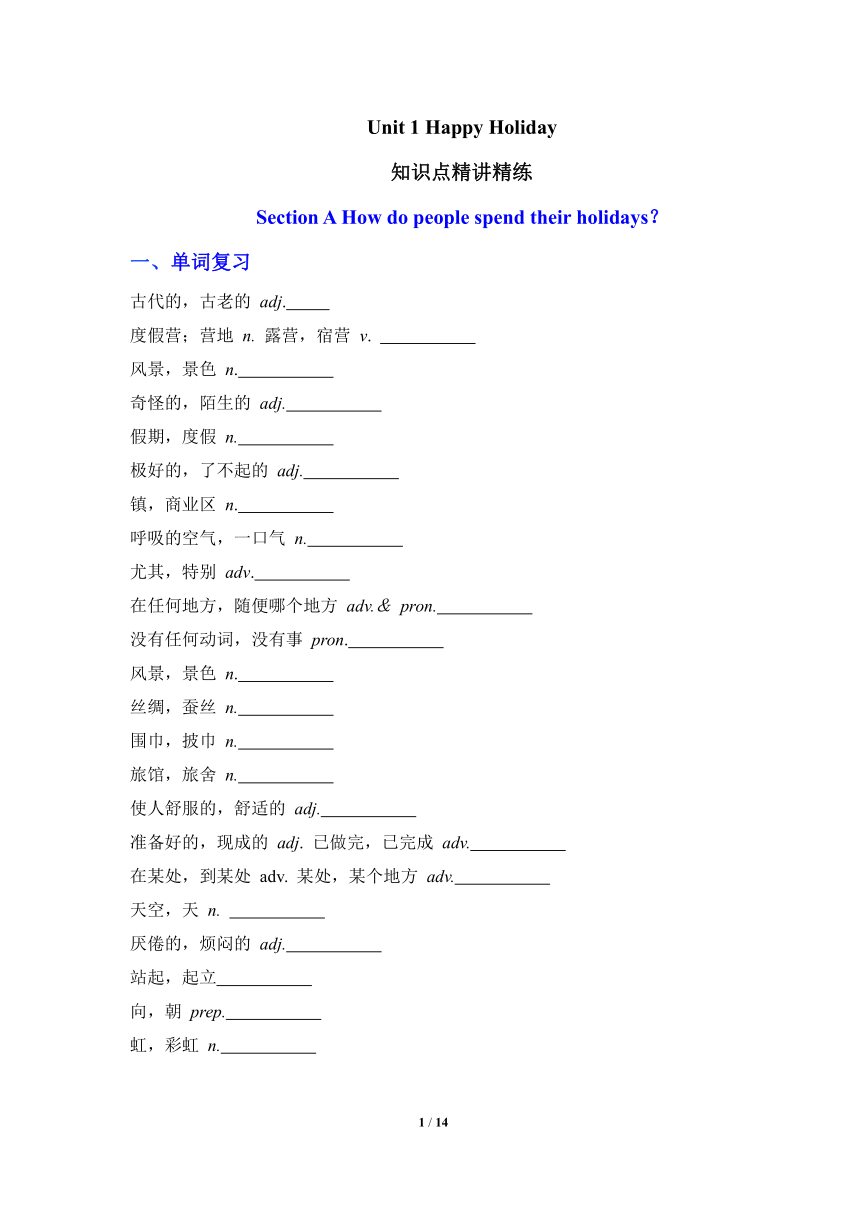 | |
| 格式 | doc | ||
| 文件大小 | 123.5KB | ||
| 资源类型 | 教案 | ||
| 版本资源 | 人教版 | ||
| 科目 | 英语 | ||
| 更新时间 | 2025-08-03 17:01:45 | ||
图片预览

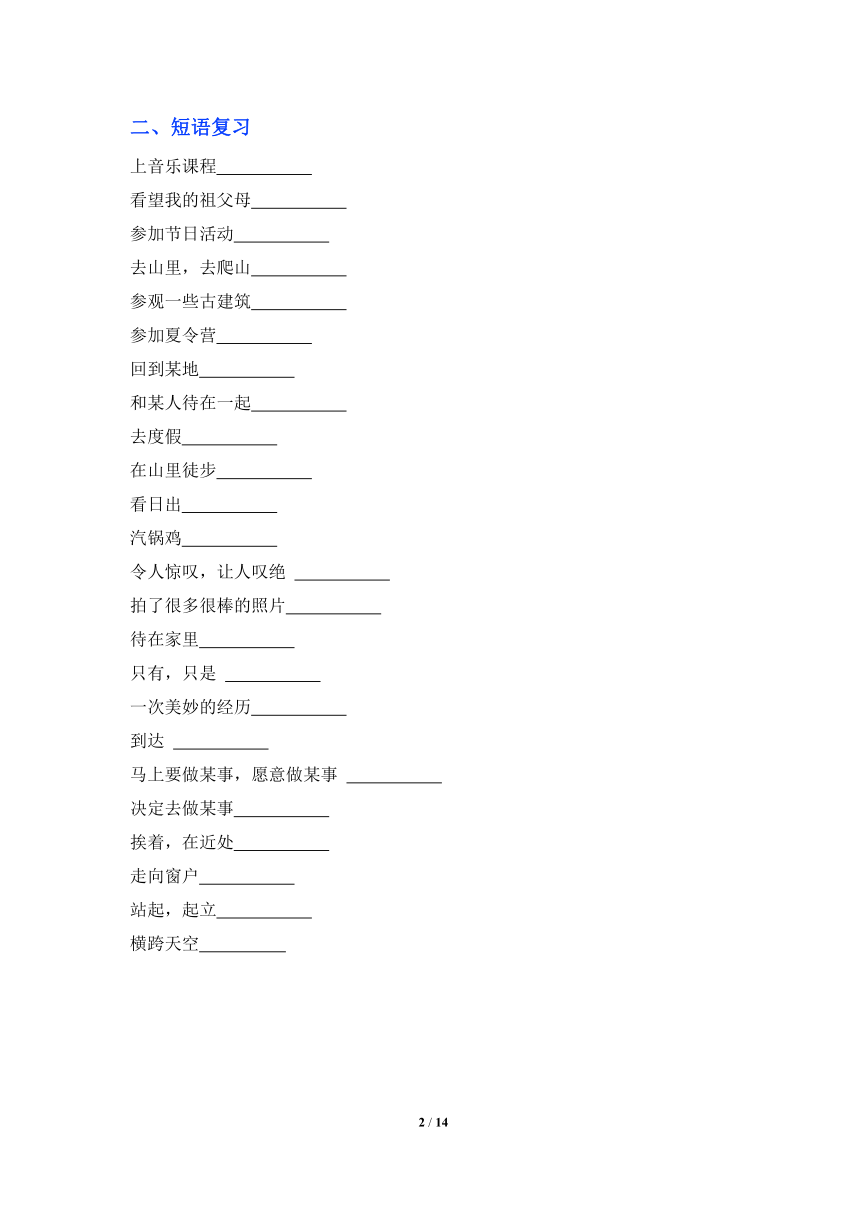
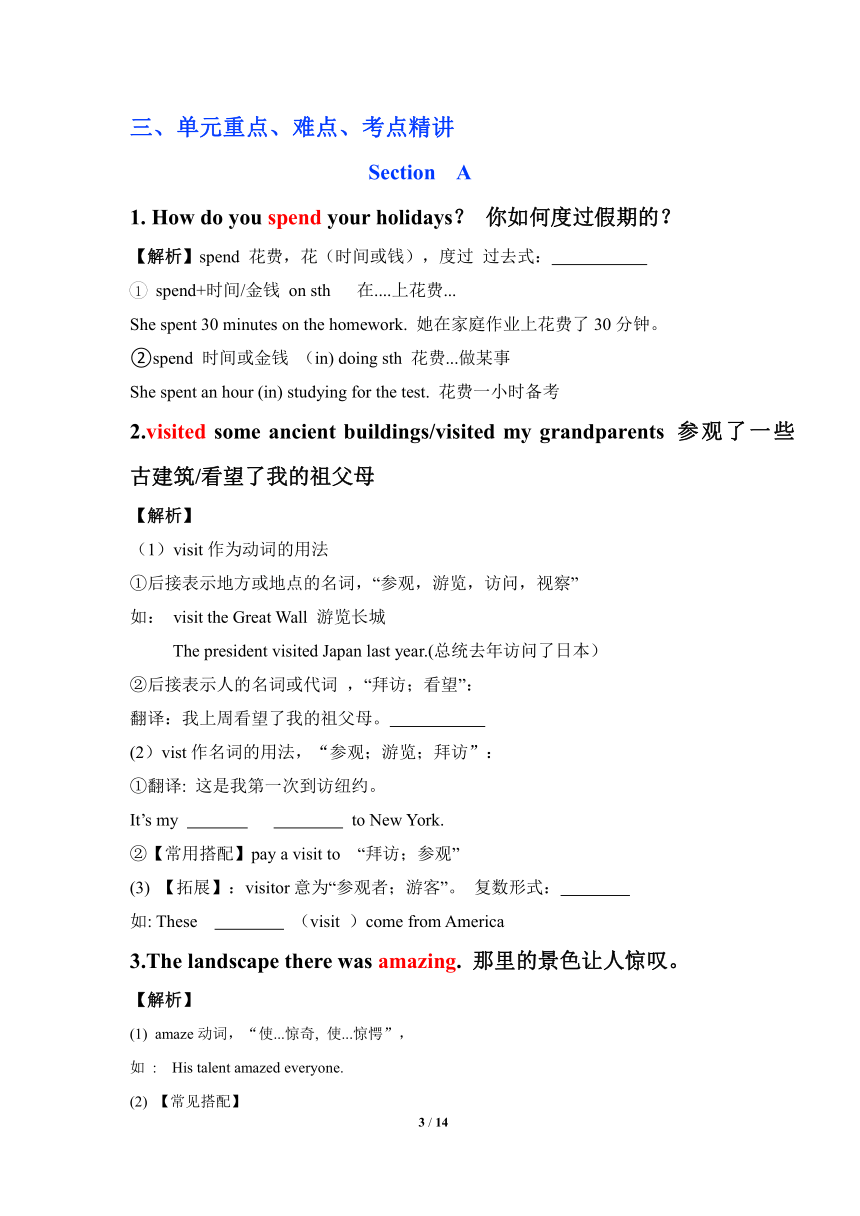
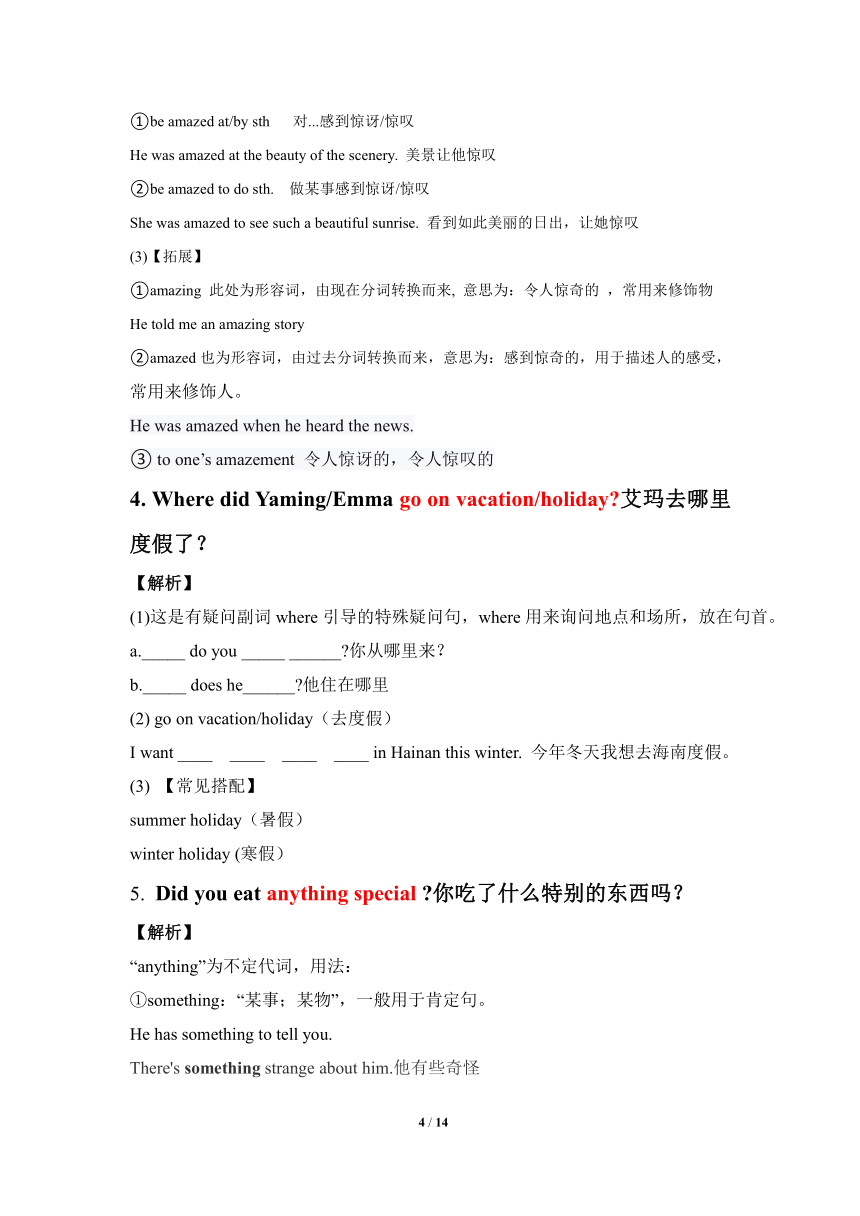
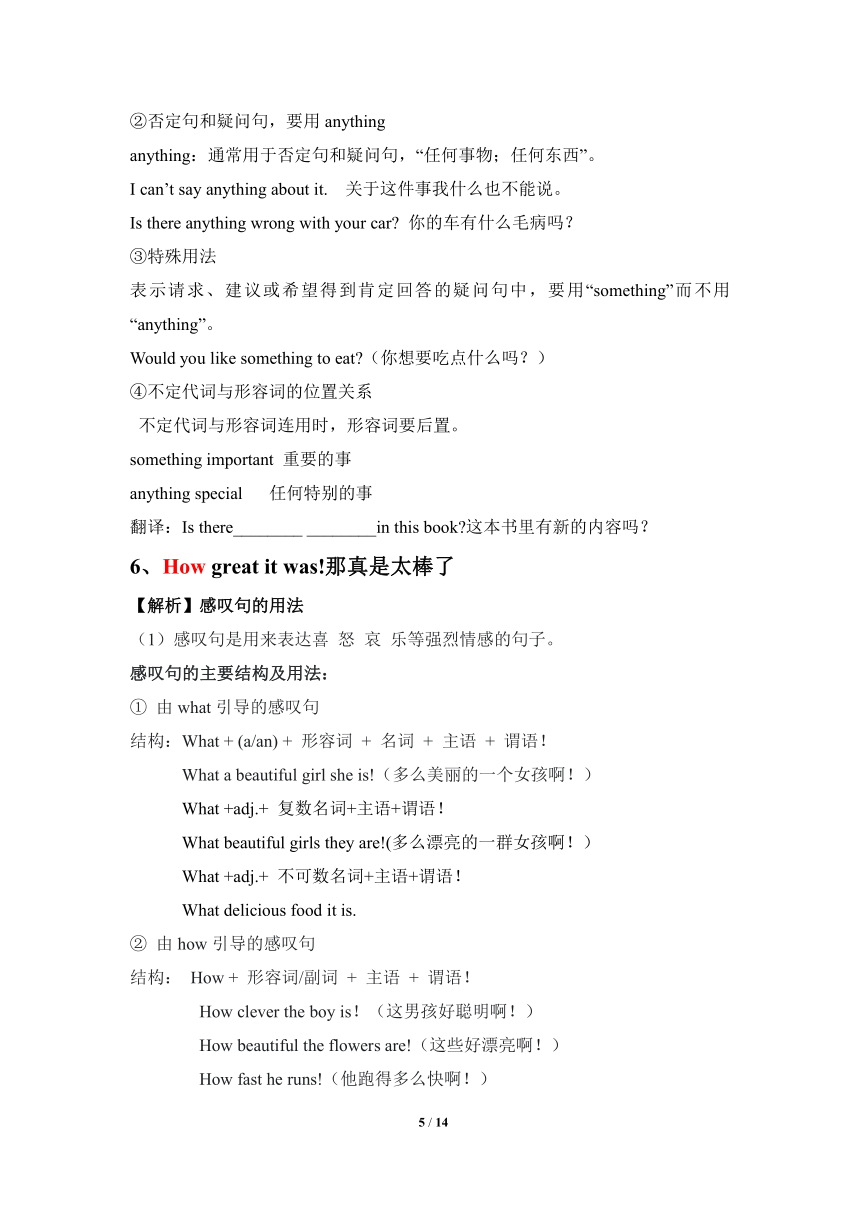
文档简介
Unit 1 Happy Holiday
知识点精讲精练
Section A How do people spend their holidays?
一、单词复习
古代的,古老的 adj.
度假营;营地 n. 露营,宿营 v.
风景,景色 n.
奇怪的,陌生的 adj.
假期,度假 n.
极好的,了不起的 adj.
镇,商业区 n.
呼吸的空气,一口气 n.
尤其,特别 adv.
在任何地方,随便哪个地方 adv.& pron.
没有任何动词,没有事 pron.
风景,景色 n.
丝绸,蚕丝 n.
围巾,披巾 n.
旅馆,旅舍 n.
使人舒服的,舒适的 adj.
准备好的,现成的 adj. 已做完,已完成 adv.
在某处,到某处 adv. 某处,某个地方 adv.
天空,天 n.
厌倦的,烦闷的 adj.
站起,起立
向,朝 prep.
虹,彩虹 n.
二、短语复习
上音乐课程
看望我的祖父母
参加节日活动
去山里,去爬山
参观一些古建筑
参加夏令营
回到某地
和某人待在一起
去度假
在山里徒步
看日出
汽锅鸡
令人惊叹,让人叹绝
拍了很多很棒的照片
待在家里
只有,只是
一次美妙的经历
到达
马上要做某事,愿意做某事
决定去做某事
挨着,在近处
走向窗户
站起,起立
横跨天空
三、单元重点、难点、考点精讲
Section A
1. How do you spend your holidays? 你如何度过假期的?
【解析】spend 花费,花(时间或钱),度过 过去式:
spend+时间/金钱 on sth 在....上花费...
She spent 30 minutes on the homework. 她在家庭作业上花费了30分钟。
②spend 时间或金钱 (in) doing sth 花费...做某事
She spent an hour (in) studying for the test. 花费一小时备考
2.visited some ancient buildings/visited my grandparents 参观了一些古建筑/看望了我的祖父母
【解析】
(1)visit作为动词的用法
①后接表示地方或地点的名词,“参观,游览,访问,视察”
如: visit the Great Wall 游览长城
The president visited Japan last year.(总统去年访问了日本)
②后接表示人的名词或代词 ,“拜访;看望”:
翻译:我上周看望了我的祖父母。
(2)vist作名词的用法,“参观;游览;拜访”:
①翻译: 这是我第一次到访纽约。
It’s my to New York.
②【常用搭配】pay a visit to “拜访;参观”
【拓展】:visitor意为“参观者;游客”。 复数形式:
如: These (visit )come from America
3.The landscape there was amazing. 那里的景色让人惊叹。
【解析】
amaze动词,“使...惊奇, 使...惊愕”,
如 : His talent amazed everyone.
【常见搭配】
①be amazed at/by sth 对...感到惊讶/惊叹
He was amazed at the beauty of the scenery. 美景让他惊叹
②be amazed to do sth. 做某事感到惊讶/惊叹
She was amazed to see such a beautiful sunrise. 看到如此美丽的日出,让她惊叹
(3)【拓展】
①amazing 此处为形容词,由现在分词转换而来, 意思为:令人惊奇的 ,常用来修饰物
He told me an amazing story
②amazed也为形容词,由过去分词转换而来,意思为:感到惊奇的,用于描述人的感受,常用来修饰人。
He was amazed when he heard the news.
③ to one’s amazement 令人惊讶的,令人惊叹的
4. Where did Yaming/Emma go on vacation/holiday 艾玛去哪里度假了?
【解析】
(1)这是有疑问副词where引导的特殊疑问句,where用来询问地点和场所,放在句首。
a._____ do you _____ ______ 你从哪里来?
b._____ does he______ 他住在哪里
(2) go on vacation/holiday(去度假)
I want ____ ____ ____ ____ in Hainan this winter. 今年冬天我想去海南度假。
【常见搭配】
summer holiday(暑假)
winter holiday (寒假)
Did you eat anything special 你吃了什么特别的东西吗?
【解析】
“anything”为不定代词,用法:
①something:“某事;某物”,一般用于肯定句。
He has something to tell you.
There's something strange about him.他有些奇怪
②否定句和疑问句,要用anything
anything:通常用于否定句和疑问句,“任何事物;任何东西”。
I can’t say anything about it. 关于这件事我什么也不能说。
Is there anything wrong with your car 你的车有什么毛病吗?
③特殊用法
表示请求、建议或希望得到肯定回答的疑问句中,要用“something”而不用“anything”。
Would you like something to eat (你想要吃点什么吗?)
④不定代词与形容词的位置关系
不定代词与形容词连用时,形容词要后置。
something important 重要的事
anything special 任何特别的事
翻译:Is there________ ________in this book 这本书里有新的内容吗?
6、How great it was!那真是太棒了
【解析】感叹句的用法
(1)感叹句是用来表达喜 怒 哀 乐等强烈情感的句子。
感叹句的主要结构及用法:
① 由what引导的感叹句
结构:What + (a/an) + 形容词 + 名词 + 主语 + 谓语!
What a beautiful girl she is!(多么美丽的一个女孩啊!)
What +adj.+ 复数名词+主语+谓语!
What beautiful girls they are!(多么漂亮的一群女孩啊!)
What +adj.+ 不可数名词+主语+谓语!
What delicious food it is.
② 由how引导的感叹句
结构: How + 形容词/副词 + 主语 + 谓语!
How clever the boy is!(这男孩好聪明啊!)
How beautiful the flowers are!(这些好漂亮啊!)
How fast he runs!(他跑得多么快啊!)
(2)【随堂练习】
1.____a clever girl she is!
A. Who B. What C. How D. Where
2._____interesting the dog is!
A. Who B. What C. Where D. How
3 What an interesting book it is! (改写感叹句)
7.We stayed in the old town for a few days, and we enjoyed it very much.我们在老城区待了几天,并且很喜欢老城区。
【解析1】
“a few” “few” “a little” “little”的区别:
(1)所修饰的词
①a few和few:后加可数名词的复数,
a few boys(几个男孩),
few words(很少几个单词)。
②a little和little:后加不可数名词,
a little water(一些水
little milk(几乎没有牛奶)。
(2)暗含的含义及语气
①a few和a little:表示“有一些、的几个”,强调有一定数量,为肯定语气。
She made a few mistakes .(她出了点错误。)
There is a little water here.(这里有一点水。)
②few和little:是“很少、几乎没有”,强调数量极少,为否定语气。
Few students passed the exam.(很少有学生通过考试。)
There is little water here.(这里几乎没有水)
(3)【随堂练习】
1 Could you give me ___ sugar I'm making coffee.
A. few B. a few C. little D. a little
2 Very ___ people came to the meeting because of the heavy rain.
A. few B. a few C. little D. a little
3 Don't worry, we still have ___ time before the train leaves.
A. few B. a few C. little D. a little
【解析2】
enjoy动词,“喜爱;欣赏;享受……的乐趣”,
(1)其后接名词,代词或动名词作宾语。
Do you enjoy your job 你喜欢你的工作吗?
.I enjoy reading books. 我喜欢读书。(enjoy doing sth.喜欢做某事)
(2)【拓展】
①enjoy oneself =have a good time = have fun 玩得开心
② enjoyable形容词,意为“愉快的;快乐的”。
we had an enjoyable vacation. 我们有一个愉快的假期。
It just took my breath away.它让我惊呆了
【解析】
(1)take one’s breath away 使某人惊叹;使某人陶醉,令人叹绝
(2)breath”名词,常见用法如下:
表示“呼吸;气息” Take a deep breath. 深呼吸
(3)【常见搭配】
①out of breath 上气不接下气;喘不过气。
He ran so fast that he was out of breath.(他跑得太快,以至于上气不接下气。)
②hold one's breath 屏住呼吸
She held her breath as the horses came toward the finish line.当马群跑向终点时,她紧张得屏住呼吸。
③catch one's breath“喘口气;恢复正常呼吸”的意思。
After running for a long time, he stopped to catch his breath.(跑了很长时间后,他停下来喘口气。
9. We took a lot of great photos there.我们在那里拍了好多极好的照片。
【解析】
(1)take photos意为 ,相当于 take pictures,
表示“给某人或某物拍照”时,要与介词of搭配。
They are taking photos in the park.他们正在公园里拍照。
Would you like to take photos of me 你愿意给我拍照吗?
a lot of 许多 后接不可数名词或可数名词复数形式,同义短语为lots of,意思用法一样。
There are lots of (宾馆)near the sea.
10.Everything tasted good,especially the steamed chicken soup所有的东西尝起来真的很好吃,尤其是蒸鸡汤。
【解析】
(1)taste为系动词,意为“尝起来,品尝”,过去式: ,其后接形容词构成系表结构。
如: The food tastes really great.食物尝起来棒极了。
作为名词,味道,滋味,
I don't like the taste of the olives 我不喜欢橄榄的味道。
11.We also tried some Yunnan dishes. 我们也品尝了一些云南菜
【解析】
(1)try此处用作动词,过去式: ___ ,其后常接名词、动名词或不定式,意为“尝试;试图,设法;努力”
She is trying my bike.她正在试骑我的自行车。
(2)拓展:try也可用作名词,意为“尝试”,常用短语“have a try”,意为“试一试”。
I want to have a try.我想试一试。
(3)辨析:try doing sth. / try to do sth.
1)try doing sth. 尝试做某事,表示一种尝试、做做看的想法,不一定付出很多努力。
2)try to do sth.尽力、设法去做某事,表示想尽一切办法要把事情办成,强调付出努力设法去完成。
a. I ______ ______ him, but no one answered. 我试着给他打电话了,但没有人接听。
b. I’m ______ ______ ______ English well. 我正尽力把英语学好。
12. We had a wonderful experience. 我们有一段美好的经历。
【解析】
experience的用法
① 作名词:表示 "经历;经验",注意可数与不可数的区分
做经历的含义时,为可数,
I had many interesting experiences last summer.
做经验含义时,为不可数,
She has a loft of teaching experience.(她有丰富的教学经验。)
② 作动词:表示 "经历;体验",过去式:______
We experienced a heavy rain yesterday.(我们昨天经历了一场大雨。)
It rained heavily when I arrived at the town, so I could do nothing but stay in the hotel.当我到达小镇时,雨下得很大,我只能待在酒店里。
【解析】
(1) rain heavily 指 "下大雨,雨下的很大", heavily为副词,此处修饰动词 rain
类似的表达:rain hard(雨下的大,hard此处也为副词,修饰动词rain)
a heavy rain(heavy为此处为形容词,修饰名词rain)
(2) arrive at / arrive in
arrive in表示到达较大的地方,如国家、省、市等;
arrive at表示到达较小的地方,如机场、商店、广场、村庄等。(注:地点副词home,here,there前介词at in省略)
We arrived at the airport at 10 o'clock.
They arrived in Shanghai last week.
We arrive there in the morning.
【拓展】“get to” “reach”和 “arrive in/at”都有“到达” , 用法区分:
①get to:是较为口语化的表达,后接地点名词。I got to the school at 7:30 o'clock.当接副词时,如home、here、there等,需省略to,get home(到家)。
②reach:是及物动词,后接地点名词或代词作宾语。They reached the top of the mountain at last.(他们最终到达了山顶) ,不用区分地点的大小。
③arrive in:后接大地点,如城市、国家等。
arrive at若接小地点,如村庄,车站等
(3)nothing but表示 "只有;仅仅",后接名词或动词原形
He had nothing but a piece of bread for lunch.(他午餐只有一片面包。)
拓展:nothing but + 动词原形(表示 "只能做...")
I did nothing but read the book.(我只能看书。)
They do nothing but relax, sleep or watch TV. (他们什么都没做,只是放松、睡觉或看电视。)
Someone had left a book in my room, and that was exactly what I needed.有人在房间里留下了一本书,这正是我所需要的。
【解析】
had+过去分词,此句为过去完成时,表示过去某一时间前就已经发生或完成了的动作,对过去的某一点造成的某种影响或是结果,用来指在另一个过去行动之前就已经完成了的事件。
By nine o’clock last night,we had got 200 pictures from the spaceship.
He said he had worked in that factory since 1949.
(2) leave sth + 地点 表示 "把某物拉在某地,忘在某地"
Tom left her book in the classroom.(把书落在教室了。)
【区别】forget(忘记)不接地点,如:I forgot my book.(我忘记带书了。)
【注意】leave的词组
leave + 某地 “离开某地”如: leave Shanghai 离开上海
leave + 某地+ for + 某地 “离开某地方前往另一个地方”
leave Shanghai for Wuhan 离开上海去武汉
leave for +某地 “去某地”相当于go to +某地方
Leave for Shanghai 去上海
② exactly副词,"确切地;正好"
That's exactly what I want to say.(那正是我想说的。)
I was so bored that I decided to find something to read. 我感到很无聊,决定找点东西读。
【解析】
(1) so…that… "如此... 以至于...",
结构:so + 形容词 / 副词 + that + 从句(句子)
The music was so loud that we couldn't talk.
(2)【辨析】so...that...与so that
①so... that...
“so”后接形容词或副词,“that”引导结果状语从句,意为“如此……以至于……”,
He speaks so quickly that no one can understand him
②so that:引导目的状语从句,意为“以便;为了”,表示目的。
He gets up early so that he can catch the first bus.(他早起以便能赶上第一班公交车。)
(3)decide动词,表示 "决定",决定做某事为______
We decided to visit out grandparents.(我们决定这周末去参观博物馆。)
【名词】decision(决定)make a decision(做决定)
She couldn't make a decision about which college to attend. 她无法决定上哪个大学。
16、I decided to visit a town close to my city.我决定去访问一个离我城市很近的小镇。
【解析】“close”常见用法,
①动词;表示关闭:
Close the door, please.
②作形容词;表示近的、接近的:常与“to”搭配
My house is close to the museum.(我家博物馆很近。)
③形容词,表示亲密的、密切的:
They are my close friends.(他们是我亲密的朋友。)
过关检测(Section A)
一、单项选择
1.There is ________ milk in the fridge, so I decide to buy some.
A.little B.few C.a little D.a few
2 They arrived ________Shanghai_________ a cold morning.
A. in, in B. in,on C. at, on D. at; in
3. Malaysian yellow noodles _______ delicious. I am sure you will like them.
A. feel B. taste C. sound D. look
4. The weather was hot,so we ________ to have a swim at the pool.
A.felt B.Made C.enjoyed D.decided
5. ________ beautiful your dress is!
A.How B.What a C.What D.How a
6 The girl in purple is new here, so______ people know her.
A. few B. a few C. little D. a little
7.What bad weather it was!We decided .
A.to go out B.not to go out C.to not go out D.not going out
8.—Is there in today’s newspaper —Yes,there is.
A.special something B.special anything
C.something special D.anything special
二、填写单词
1. We decided to visit ______ (古老的)building in Xi'an next week.
2. Something ______ (奇怪的)happened this morning
3. He does't want to go there, e______ on such a rainy day.
4. How many (围巾) do you have?
5 Please make yourself _____(舒服的)while I get some coffee.
6 It is important to try and learn from e ____.
7.He could finish the task quickly and (easy).
8 ---You’ve got the job F .
三 完型填空
This week, I asked my classmates about their vacations. Here are some of their answers.
Tina 1 to New York City. The 2 was sunny and the people 3 friendly to her. She went there by 4 and the bus trip was relaxing. The food was delicious. She had a 5 vacation.
Sally went to 6 her uncle. Because the weather was windy and 7 , she had to stay at home. She watched TV 8 the TV shows were boring. She went shopping with her cousin but the shop assistants were 9 .She had a terrible vacation.
Tom stayed at home. At first he did his homework. It was a little difficult. Then he 10 computer games. They were interesting. He thought his vacation was OK.
1.A.go B.goes C.went D.going
2.A.place B.weather C.museum D.beach
3.A.were B.was C.is D.are
4.A.bike B.train C.plane D.bus
5.A.bad B.terrible C.great D.boring
6.A.visit B.visited C.look D.read
7.A.rain B.rainy C.sun D.snow
8.A.but B.and C.or D.with
9.A.friend B.unfriend C.friendly D.unfriendly
10.A.play B.played C.listened D.wrote
四、阅读表达
Tom went to a beautiful beach on Monday with his friends on vacation. It was sunny and hot.(1)So they had great fun playing in the water. In the afternoon, they went shopping. But the shops were crowded, they didn’t really enjoy it.
The next day, it was rainy, so he went to a museum. It was boring. Tom found a small boy crying in the corner. The boy was lost. He helped the boy find his father. Tom was very happy.(2)Bu the had no money for a taxi. So he had to walk back to the hotel. That made him very tired.
On Wednesday, the weather was very cool. So he played tennis. He played all morning. It was really fun.
(一)根据短文内容简要回答下列问题。
1.What was the weather like on Tuesday
____________________________________________________________________
2.What did Tom do on Wednesday
____________________________________________________________________
(二)将短文中画线的句子译成汉语。
3. __________________________________________________________________
4. __________________________________________________________________
1 / 11
知识点精讲精练
Section A How do people spend their holidays?
一、单词复习
古代的,古老的 adj.
度假营;营地 n. 露营,宿营 v.
风景,景色 n.
奇怪的,陌生的 adj.
假期,度假 n.
极好的,了不起的 adj.
镇,商业区 n.
呼吸的空气,一口气 n.
尤其,特别 adv.
在任何地方,随便哪个地方 adv.& pron.
没有任何动词,没有事 pron.
风景,景色 n.
丝绸,蚕丝 n.
围巾,披巾 n.
旅馆,旅舍 n.
使人舒服的,舒适的 adj.
准备好的,现成的 adj. 已做完,已完成 adv.
在某处,到某处 adv. 某处,某个地方 adv.
天空,天 n.
厌倦的,烦闷的 adj.
站起,起立
向,朝 prep.
虹,彩虹 n.
二、短语复习
上音乐课程
看望我的祖父母
参加节日活动
去山里,去爬山
参观一些古建筑
参加夏令营
回到某地
和某人待在一起
去度假
在山里徒步
看日出
汽锅鸡
令人惊叹,让人叹绝
拍了很多很棒的照片
待在家里
只有,只是
一次美妙的经历
到达
马上要做某事,愿意做某事
决定去做某事
挨着,在近处
走向窗户
站起,起立
横跨天空
三、单元重点、难点、考点精讲
Section A
1. How do you spend your holidays? 你如何度过假期的?
【解析】spend 花费,花(时间或钱),度过 过去式:
spend+时间/金钱 on sth 在....上花费...
She spent 30 minutes on the homework. 她在家庭作业上花费了30分钟。
②spend 时间或金钱 (in) doing sth 花费...做某事
She spent an hour (in) studying for the test. 花费一小时备考
2.visited some ancient buildings/visited my grandparents 参观了一些古建筑/看望了我的祖父母
【解析】
(1)visit作为动词的用法
①后接表示地方或地点的名词,“参观,游览,访问,视察”
如: visit the Great Wall 游览长城
The president visited Japan last year.(总统去年访问了日本)
②后接表示人的名词或代词 ,“拜访;看望”:
翻译:我上周看望了我的祖父母。
(2)vist作名词的用法,“参观;游览;拜访”:
①翻译: 这是我第一次到访纽约。
It’s my to New York.
②【常用搭配】pay a visit to “拜访;参观”
【拓展】:visitor意为“参观者;游客”。 复数形式:
如: These (visit )come from America
3.The landscape there was amazing. 那里的景色让人惊叹。
【解析】
amaze动词,“使...惊奇, 使...惊愕”,
如 : His talent amazed everyone.
【常见搭配】
①be amazed at/by sth 对...感到惊讶/惊叹
He was amazed at the beauty of the scenery. 美景让他惊叹
②be amazed to do sth. 做某事感到惊讶/惊叹
She was amazed to see such a beautiful sunrise. 看到如此美丽的日出,让她惊叹
(3)【拓展】
①amazing 此处为形容词,由现在分词转换而来, 意思为:令人惊奇的 ,常用来修饰物
He told me an amazing story
②amazed也为形容词,由过去分词转换而来,意思为:感到惊奇的,用于描述人的感受,常用来修饰人。
He was amazed when he heard the news.
③ to one’s amazement 令人惊讶的,令人惊叹的
4. Where did Yaming/Emma go on vacation/holiday 艾玛去哪里度假了?
【解析】
(1)这是有疑问副词where引导的特殊疑问句,where用来询问地点和场所,放在句首。
a._____ do you _____ ______ 你从哪里来?
b._____ does he______ 他住在哪里
(2) go on vacation/holiday(去度假)
I want ____ ____ ____ ____ in Hainan this winter. 今年冬天我想去海南度假。
【常见搭配】
summer holiday(暑假)
winter holiday (寒假)
Did you eat anything special 你吃了什么特别的东西吗?
【解析】
“anything”为不定代词,用法:
①something:“某事;某物”,一般用于肯定句。
He has something to tell you.
There's something strange about him.他有些奇怪
②否定句和疑问句,要用anything
anything:通常用于否定句和疑问句,“任何事物;任何东西”。
I can’t say anything about it. 关于这件事我什么也不能说。
Is there anything wrong with your car 你的车有什么毛病吗?
③特殊用法
表示请求、建议或希望得到肯定回答的疑问句中,要用“something”而不用“anything”。
Would you like something to eat (你想要吃点什么吗?)
④不定代词与形容词的位置关系
不定代词与形容词连用时,形容词要后置。
something important 重要的事
anything special 任何特别的事
翻译:Is there________ ________in this book 这本书里有新的内容吗?
6、How great it was!那真是太棒了
【解析】感叹句的用法
(1)感叹句是用来表达喜 怒 哀 乐等强烈情感的句子。
感叹句的主要结构及用法:
① 由what引导的感叹句
结构:What + (a/an) + 形容词 + 名词 + 主语 + 谓语!
What a beautiful girl she is!(多么美丽的一个女孩啊!)
What +adj.+ 复数名词+主语+谓语!
What beautiful girls they are!(多么漂亮的一群女孩啊!)
What +adj.+ 不可数名词+主语+谓语!
What delicious food it is.
② 由how引导的感叹句
结构: How + 形容词/副词 + 主语 + 谓语!
How clever the boy is!(这男孩好聪明啊!)
How beautiful the flowers are!(这些好漂亮啊!)
How fast he runs!(他跑得多么快啊!)
(2)【随堂练习】
1.____a clever girl she is!
A. Who B. What C. How D. Where
2._____interesting the dog is!
A. Who B. What C. Where D. How
3 What an interesting book it is! (改写感叹句)
7.We stayed in the old town for a few days, and we enjoyed it very much.我们在老城区待了几天,并且很喜欢老城区。
【解析1】
“a few” “few” “a little” “little”的区别:
(1)所修饰的词
①a few和few:后加可数名词的复数,
a few boys(几个男孩),
few words(很少几个单词)。
②a little和little:后加不可数名词,
a little water(一些水
little milk(几乎没有牛奶)。
(2)暗含的含义及语气
①a few和a little:表示“有一些、的几个”,强调有一定数量,为肯定语气。
She made a few mistakes .(她出了点错误。)
There is a little water here.(这里有一点水。)
②few和little:是“很少、几乎没有”,强调数量极少,为否定语气。
Few students passed the exam.(很少有学生通过考试。)
There is little water here.(这里几乎没有水)
(3)【随堂练习】
1 Could you give me ___ sugar I'm making coffee.
A. few B. a few C. little D. a little
2 Very ___ people came to the meeting because of the heavy rain.
A. few B. a few C. little D. a little
3 Don't worry, we still have ___ time before the train leaves.
A. few B. a few C. little D. a little
【解析2】
enjoy动词,“喜爱;欣赏;享受……的乐趣”,
(1)其后接名词,代词或动名词作宾语。
Do you enjoy your job 你喜欢你的工作吗?
.I enjoy reading books. 我喜欢读书。(enjoy doing sth.喜欢做某事)
(2)【拓展】
①enjoy oneself =have a good time = have fun 玩得开心
② enjoyable形容词,意为“愉快的;快乐的”。
we had an enjoyable vacation. 我们有一个愉快的假期。
It just took my breath away.它让我惊呆了
【解析】
(1)take one’s breath away 使某人惊叹;使某人陶醉,令人叹绝
(2)breath”名词,常见用法如下:
表示“呼吸;气息” Take a deep breath. 深呼吸
(3)【常见搭配】
①out of breath 上气不接下气;喘不过气。
He ran so fast that he was out of breath.(他跑得太快,以至于上气不接下气。)
②hold one's breath 屏住呼吸
She held her breath as the horses came toward the finish line.当马群跑向终点时,她紧张得屏住呼吸。
③catch one's breath“喘口气;恢复正常呼吸”的意思。
After running for a long time, he stopped to catch his breath.(跑了很长时间后,他停下来喘口气。
9. We took a lot of great photos there.我们在那里拍了好多极好的照片。
【解析】
(1)take photos意为 ,相当于 take pictures,
表示“给某人或某物拍照”时,要与介词of搭配。
They are taking photos in the park.他们正在公园里拍照。
Would you like to take photos of me 你愿意给我拍照吗?
a lot of 许多 后接不可数名词或可数名词复数形式,同义短语为lots of,意思用法一样。
There are lots of (宾馆)near the sea.
10.Everything tasted good,especially the steamed chicken soup所有的东西尝起来真的很好吃,尤其是蒸鸡汤。
【解析】
(1)taste为系动词,意为“尝起来,品尝”,过去式: ,其后接形容词构成系表结构。
如: The food tastes really great.食物尝起来棒极了。
作为名词,味道,滋味,
I don't like the taste of the olives 我不喜欢橄榄的味道。
11.We also tried some Yunnan dishes. 我们也品尝了一些云南菜
【解析】
(1)try此处用作动词,过去式: ___ ,其后常接名词、动名词或不定式,意为“尝试;试图,设法;努力”
She is trying my bike.她正在试骑我的自行车。
(2)拓展:try也可用作名词,意为“尝试”,常用短语“have a try”,意为“试一试”。
I want to have a try.我想试一试。
(3)辨析:try doing sth. / try to do sth.
1)try doing sth. 尝试做某事,表示一种尝试、做做看的想法,不一定付出很多努力。
2)try to do sth.尽力、设法去做某事,表示想尽一切办法要把事情办成,强调付出努力设法去完成。
a. I ______ ______ him, but no one answered. 我试着给他打电话了,但没有人接听。
b. I’m ______ ______ ______ English well. 我正尽力把英语学好。
12. We had a wonderful experience. 我们有一段美好的经历。
【解析】
experience的用法
① 作名词:表示 "经历;经验",注意可数与不可数的区分
做经历的含义时,为可数,
I had many interesting experiences last summer.
做经验含义时,为不可数,
She has a loft of teaching experience.(她有丰富的教学经验。)
② 作动词:表示 "经历;体验",过去式:______
We experienced a heavy rain yesterday.(我们昨天经历了一场大雨。)
It rained heavily when I arrived at the town, so I could do nothing but stay in the hotel.当我到达小镇时,雨下得很大,我只能待在酒店里。
【解析】
(1) rain heavily 指 "下大雨,雨下的很大", heavily为副词,此处修饰动词 rain
类似的表达:rain hard(雨下的大,hard此处也为副词,修饰动词rain)
a heavy rain(heavy为此处为形容词,修饰名词rain)
(2) arrive at / arrive in
arrive in表示到达较大的地方,如国家、省、市等;
arrive at表示到达较小的地方,如机场、商店、广场、村庄等。(注:地点副词home,here,there前介词at in省略)
We arrived at the airport at 10 o'clock.
They arrived in Shanghai last week.
We arrive there in the morning.
【拓展】“get to” “reach”和 “arrive in/at”都有“到达” , 用法区分:
①get to:是较为口语化的表达,后接地点名词。I got to the school at 7:30 o'clock.当接副词时,如home、here、there等,需省略to,get home(到家)。
②reach:是及物动词,后接地点名词或代词作宾语。They reached the top of the mountain at last.(他们最终到达了山顶) ,不用区分地点的大小。
③arrive in:后接大地点,如城市、国家等。
arrive at若接小地点,如村庄,车站等
(3)nothing but表示 "只有;仅仅",后接名词或动词原形
He had nothing but a piece of bread for lunch.(他午餐只有一片面包。)
拓展:nothing but + 动词原形(表示 "只能做...")
I did nothing but read the book.(我只能看书。)
They do nothing but relax, sleep or watch TV. (他们什么都没做,只是放松、睡觉或看电视。)
Someone had left a book in my room, and that was exactly what I needed.有人在房间里留下了一本书,这正是我所需要的。
【解析】
had+过去分词,此句为过去完成时,表示过去某一时间前就已经发生或完成了的动作,对过去的某一点造成的某种影响或是结果,用来指在另一个过去行动之前就已经完成了的事件。
By nine o’clock last night,we had got 200 pictures from the spaceship.
He said he had worked in that factory since 1949.
(2) leave sth + 地点 表示 "把某物拉在某地,忘在某地"
Tom left her book in the classroom.(把书落在教室了。)
【区别】forget(忘记)不接地点,如:I forgot my book.(我忘记带书了。)
【注意】leave的词组
leave + 某地 “离开某地”如: leave Shanghai 离开上海
leave + 某地+ for + 某地 “离开某地方前往另一个地方”
leave Shanghai for Wuhan 离开上海去武汉
leave for +某地 “去某地”相当于go to +某地方
Leave for Shanghai 去上海
② exactly副词,"确切地;正好"
That's exactly what I want to say.(那正是我想说的。)
I was so bored that I decided to find something to read. 我感到很无聊,决定找点东西读。
【解析】
(1) so…that… "如此... 以至于...",
结构:so + 形容词 / 副词 + that + 从句(句子)
The music was so loud that we couldn't talk.
(2)【辨析】so...that...与so that
①so... that...
“so”后接形容词或副词,“that”引导结果状语从句,意为“如此……以至于……”,
He speaks so quickly that no one can understand him
②so that:引导目的状语从句,意为“以便;为了”,表示目的。
He gets up early so that he can catch the first bus.(他早起以便能赶上第一班公交车。)
(3)decide动词,表示 "决定",决定做某事为______
We decided to visit out grandparents.(我们决定这周末去参观博物馆。)
【名词】decision(决定)make a decision(做决定)
She couldn't make a decision about which college to attend. 她无法决定上哪个大学。
16、I decided to visit a town close to my city.我决定去访问一个离我城市很近的小镇。
【解析】“close”常见用法,
①动词;表示关闭:
Close the door, please.
②作形容词;表示近的、接近的:常与“to”搭配
My house is close to the museum.(我家博物馆很近。)
③形容词,表示亲密的、密切的:
They are my close friends.(他们是我亲密的朋友。)
过关检测(Section A)
一、单项选择
1.There is ________ milk in the fridge, so I decide to buy some.
A.little B.few C.a little D.a few
2 They arrived ________Shanghai_________ a cold morning.
A. in, in B. in,on C. at, on D. at; in
3. Malaysian yellow noodles _______ delicious. I am sure you will like them.
A. feel B. taste C. sound D. look
4. The weather was hot,so we ________ to have a swim at the pool.
A.felt B.Made C.enjoyed D.decided
5. ________ beautiful your dress is!
A.How B.What a C.What D.How a
6 The girl in purple is new here, so______ people know her.
A. few B. a few C. little D. a little
7.What bad weather it was!We decided .
A.to go out B.not to go out C.to not go out D.not going out
8.—Is there in today’s newspaper —Yes,there is.
A.special something B.special anything
C.something special D.anything special
二、填写单词
1. We decided to visit ______ (古老的)building in Xi'an next week.
2. Something ______ (奇怪的)happened this morning
3. He does't want to go there, e______ on such a rainy day.
4. How many (围巾) do you have?
5 Please make yourself _____(舒服的)while I get some coffee.
6 It is important to try and learn from e ____.
7.He could finish the task quickly and (easy).
8 ---You’ve got the job F .
三 完型填空
This week, I asked my classmates about their vacations. Here are some of their answers.
Tina 1 to New York City. The 2 was sunny and the people 3 friendly to her. She went there by 4 and the bus trip was relaxing. The food was delicious. She had a 5 vacation.
Sally went to 6 her uncle. Because the weather was windy and 7 , she had to stay at home. She watched TV 8 the TV shows were boring. She went shopping with her cousin but the shop assistants were 9 .She had a terrible vacation.
Tom stayed at home. At first he did his homework. It was a little difficult. Then he 10 computer games. They were interesting. He thought his vacation was OK.
1.A.go B.goes C.went D.going
2.A.place B.weather C.museum D.beach
3.A.were B.was C.is D.are
4.A.bike B.train C.plane D.bus
5.A.bad B.terrible C.great D.boring
6.A.visit B.visited C.look D.read
7.A.rain B.rainy C.sun D.snow
8.A.but B.and C.or D.with
9.A.friend B.unfriend C.friendly D.unfriendly
10.A.play B.played C.listened D.wrote
四、阅读表达
Tom went to a beautiful beach on Monday with his friends on vacation. It was sunny and hot.(1)So they had great fun playing in the water. In the afternoon, they went shopping. But the shops were crowded, they didn’t really enjoy it.
The next day, it was rainy, so he went to a museum. It was boring. Tom found a small boy crying in the corner. The boy was lost. He helped the boy find his father. Tom was very happy.(2)Bu the had no money for a taxi. So he had to walk back to the hotel. That made him very tired.
On Wednesday, the weather was very cool. So he played tennis. He played all morning. It was really fun.
(一)根据短文内容简要回答下列问题。
1.What was the weather like on Tuesday
____________________________________________________________________
2.What did Tom do on Wednesday
____________________________________________________________________
(二)将短文中画线的句子译成汉语。
3. __________________________________________________________________
4. __________________________________________________________________
1 / 11
同课章节目录
